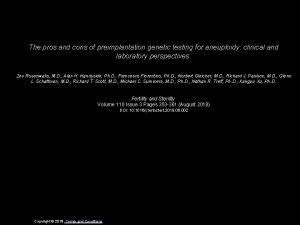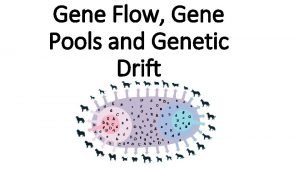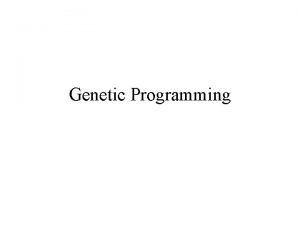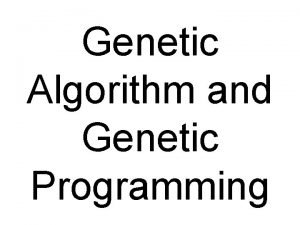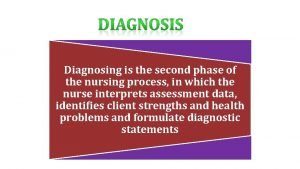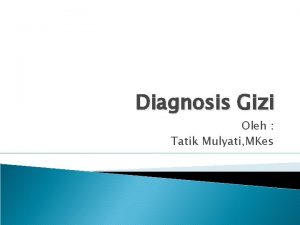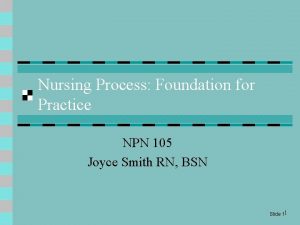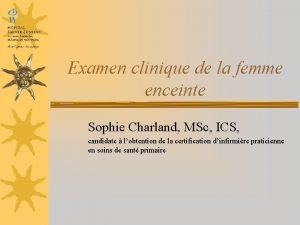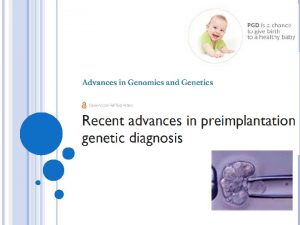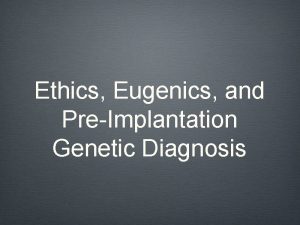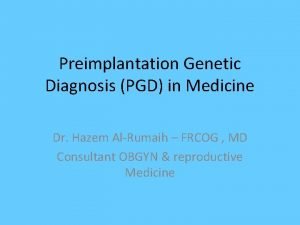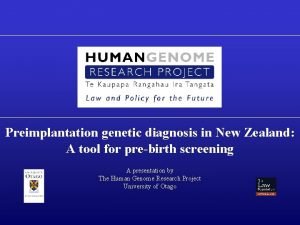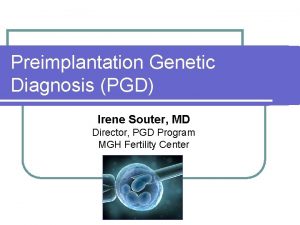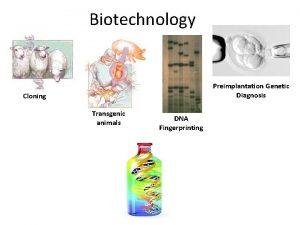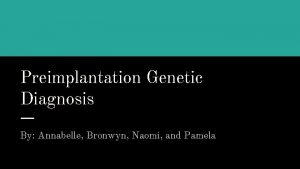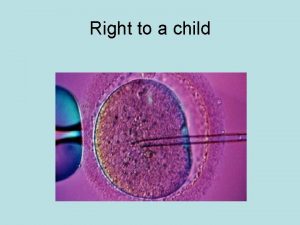Preimplantation genetic diagnosis Shannon House Morgan Anderson Sophie


















- Slides: 18

Preimplantation genetic diagnosis Shannon House, Morgan Anderson, Sophie Bik, Berta Luis and Linsey Nuquist

What is it? ● PGD is a technique that enables people with specific inherited condition in their family to avoid passing it on to their children. Involves checking embryos’ genes created through IVF for genetic conditions. ● It screens embryos for potentially deadly genetic mutations to weed out unwanted mutations by removing a single defective gene.

How it's done 1. One cell is taken from the embryo using very small medical instruments known as pipettes. 2. The DNA is carefully retrieved from this cell. It is copied with the help of a process known as PCR or polymerase chain reaction. 3. A molecular analysis is done to evaluate the sequence code of the DNA to know if the gene inheritance is present. After the PGD procedure is completed and the embryos are free of any kind of problems, the next step is the implantation process through the intracytoplasmic sperm injection (ICSI) or the zygote intrafallopian transfer (ZIFT).

How it's done cont. 4. Any additional embryos that are free of genetic problems can be frozen to use at another time while embryos with a problem gene are destroyed or can be donated to science.

Laws and restrictions ● In the United states there are no laws against this, it is completely legal. ● Some European countries have restrictions and can only be practiced in certain hospitals. Not allowed: Chile, Switzerland, China, Ivory Coast, Philippines, Algeria, Ireland, and Austria. ● With PGD you can determine the sex of the baby. ● In Britain it is illegal to throw away an Embryo due to the sex (can't choose the sex of the baby)

Benefits ● ● Helps detect known genetic diseases or chromosomal abnormalities. Identifies abnormal embryos, preventing unhealthy embryos from being transferred to uterus. Reduces multiple pregnancy risk by identifying healthy embryos for implantation. Decreases risk to couples or individuals with serious inherited disorders of having children affected with same problem.

Risks of preimplantation genetic testing (PGD/PGS) ● ● ● PGD and PGS require in vitro fertilization (IVF), which involves risks of ovarian hyperstimulation syndrome, multiple pregnancy, and increased risk of birth defects not related to the genetic test. Risk of biopsy or freezing harming the embryo(s). False negative results could mean an abnormal embryo is transferred to the uterus, resulting in a possible miscarriage, and healthy embryos are discarded, limiting chances of a healthy pregnancy. Test could reveal there are no normal embryos to transfer. Tests do not screen for all possible genetic diseases or disorders, so a healthy baby is not guaranteed from a tested embryo. Preimplantation genetic diagnosis (PGD) has helped many couples conceive healthy children and is generally considered a safe practice. However, a new long-term analysis of PGD in mice suggests that this procedure may increase risks of weight gain and memory decline in adulthood. - because this is an overall new procedure we cannot know all the long term effects, especially to the child.

Pros 1. Since the procedure is done before the implantation, it reduces the requirement for amniocentesis (a medical procedure used in prenatal diagnosis of chromosomal abnormalities and fetal infections, and also used for sex determination in which a small amount of amniotic fluid, which contains fetal tissues, is sampled from the amnion or amniotic sac surrounding a developing fetus, and the fetal DNA is examined for genetic abnormalities) done later during the pregnancy. 2. This allows the couple to decide whether or not to continue with the pregnancy. 3. The couple can pursue for biological children that may not be possible otherwise. 4. PGD helps to reduce expenses due to the medical complications that may arise out of the birth defects.

Cons 1. A new life is created at conception. But the destruction of the embryo also means that you are destroying an individual. The PGD procedure mostly results in the destruction of a few embryos. 2. Sometimes, a defective embryo may mature and not show the disease or defect. Such kinds of conditions may have to be discussed properly with the health care professional. 3. Some genetic disorders may not show up until the child grows and matures. So the disorder can show up during a later stage in life.

There are several variables involved in the cost of PGD 1. 2. 3. 4. The cost of in vitro fertilization at the PGD clinic The cost of IVF medications Embryo biopsy procedure costs at the PGD clinic Chromosomal and/or genetic analysis costs - the PGD testing

Price: Average PGD IVF Costs in USA Price at Our Clinic IVF-ICSI cost $12, 000 IVF medication costs About $3500 Embryo biopsy cost $1800 PGD test cost $3500 $2200 Total $17, 200 + meds $14, 600 + meds Average preimplantation genetic testing costs in the US 1. IVF costs - in the US the average cost for IVF with ICSI is about $12, 000 to $13, 000 2. The average cost for in vitro fertilization medications is $3000 to $4000 3. Embryo biopsy charges are about $1500 to $2200 4. Aneuploidy testing (for chromosome normality) with PGD is $2200 to $5000 5. For single gene defects (such as cystic fibrosis), the cost is about the same as for aneuploidy screening, $2200 to $5000

YES OR NO?

http: //www. cbsnews. com/videos/another-pgd -story-hunter-syndrome/

Reasons to say Yes ● Allows couples to decide whether or not to continue with the pregnancy. ● The couple can pursue biological children that may not be possible otherwise. ● PDG helps to reduce expenses due to the medical complications that may arise out of the birth defects ● Protects not only children today but future families. ● Possibly eradicate all monogenic disorders, and with more research could prevent additional or if not all genetic diseases.

Disadvantages (risks)

● Embryos may be damaged in the process of cell removal ● Testing may not be 100% reliable or conclusive. ● many people believe that the deconstruction of an embryo is the deconstruction of a person. ● PGD does not eliminate regular prenatal screenings ● PGD requires IVF which involves risks of ovarian hyperstimulation syndrome, multiple pregnancy and increased risk of birth defects not related to genetic tests.

Religion ● Christianity/ Catholicism: -Believe it is destruction of human life. (murder) -Also opposes the necessary IVF of eggs. ● Judaism: -Believes the repair of genetics is okay, but they do not support making a child that is genetically fashioned.

https: //www. youtube. com/watch? v=A 05 vqy 5 NCeo
 Preimplantation genetic screening pros and cons
Preimplantation genetic screening pros and cons Genetic drift
Genetic drift Founder effect definition biology
Founder effect definition biology Gene flow vs genetic drift
Gene flow vs genetic drift Genetic programming vs genetic algorithm
Genetic programming vs genetic algorithm Genetic programming vs genetic algorithm
Genetic programming vs genetic algorithm Medical diagnosis and nursing diagnosis difference
Medical diagnosis and nursing diagnosis difference Objectives of nursing process
Objectives of nursing process Potential nursing diagnosis
Potential nursing diagnosis Perbedaan diagnosis gizi dan diagnosis medis
Perbedaan diagnosis gizi dan diagnosis medis Medical diagnosis and nursing diagnosis difference
Medical diagnosis and nursing diagnosis difference Discount houses examples in india
Discount houses examples in india Branded house house of brands
Branded house house of brands Snugbug homes
Snugbug homes Banished boarding house vs house
Banished boarding house vs house They went house to house
They went house to house My house shall be called a house of prayer
My house shall be called a house of prayer Gtpav
Gtpav Sophie rosen
Sophie rosen
